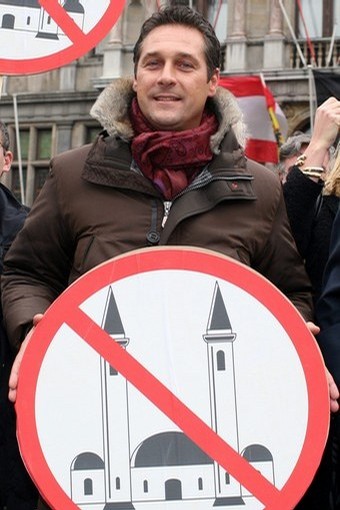 Austria’s far-right Freedom Party gained over one-fifth of the votes in Sunday’s general election, while the ruling two-party centrist coalition got its worst-ever result. The swing comes amid a Europe-wide surge in support for the far right.
Austria’s far-right Freedom Party gained over one-fifth of the votes in Sunday’s general election, while the ruling two-party centrist coalition got its worst-ever result. The swing comes amid a Europe-wide surge in support for the far right.
Though Austria’s two major centrist political parties, the conservative Popular Party and the center-left Social Democrats, have retained their majority in parliament, the resurrection of the far-right in Europe is a solid tendency marking a shift in the political mentality of Europeans.
Euroskeptic and right-wing parties in Austria have gained support from people who think the issues that matter most to them aren’t being addressed.
The extreme, radical right is drawing mass support from working-class, blue-collar voters, Sylvia Kritzinger, a political scientist at the University of Vienna, tells RT’s Peter Oliver. “Because of the policies they put forward, like immigration reform, anti-European integration, anti-corruption in the political system.”
The Viennese people Peter Oliver talked to are certain they want to “slow down immigration,” stop the EU “dictating everything” and “put Austria’s interests first.”
The leader of the Freedom Party, Heinz-Christian Strache [pictured], insists he is not a racist. “I love Austria, I don’t hate foreigners,” he says.
Across Europe, there’s a tide that’s turning right. Britain’s UK Independence Party (UKIP), which favors pulling out of the EU altogether, is being talked about as the country’s legitimate third party. Meanwhile, another euroskeptic party, Alternative for Germany, just missed out on a place in the Bundestag. Greece’s Golden Dawn ultranationalist party is the country’s third-largest political group. Norway’s conservative government came to power with tough immigration promises and there have also been far-right gains in Sweden and Finland. The latest country to swing to the right is Austria.
Austria is one of the four EU economies that underpin the eurozone, so a challenge to the parties who support the common European currency in the country could potentially affect the continent’s economic course.
Many Austrians have voted for the Freedom Party, which many critics call xenophobic, because they “don’t trust politicians in Brussels and Austrian decision-makers anymore,” Barbara Kolm, director of the Austrian Economic Center, tells RT. “They don’t believe they find the right solutions. After all it is just redistribution on a supranational level. It’s Austria’s tax euros going to other countries and just washed down the drain.”
This time the Freedom Party adopted a different campaign tactic from in previous elections. “Their message is about religious values,” says Kritzinger. “They talked about ‘love your neighbor,’ which is a very Catholic way of thinking, but of course the hidden message behind this is that they are against Islam and Muslims.”
Compared with the previous general election in 2008, the FPÖ vote rose from 17.5% to 21.4%. But this increase was achieved at the expense of the rival far-right BZÖ, which saw its share of the vote fall from 10.7% to 3.6%, resulting in the loss of all its parliamentary seats. The total far-right vote therefore declined slightly, from 28.2% to 25%, and the far-right presence in parliament was reduced from 55 MPs to 42.
Update: Loonwatch have linked to this article, and I added the following comment at their site:
The RT report is rather misleading in claiming that the vote for the FPÖ represented a “swing to the right” in Austria.
The picture is complicated by the fact that the FPÖ split in 2005 when Jörg Haider and other leading figures broke away to form a rival party, the BZÖ. As I point out in a note at the end of the RT report, at the previous general election in 2008 the FPÖ got 17.5% and the BZÖ 10.7%, making a total far-right vote of 28.2%.
However, Haider was killed in a car crash shortly after the 2008 election, and in his absence the BZÖ’s support has slumped, with its vote falling to 3.6% in 2013. So, although the FPÖ’s vote rose to 21.4%, the total far-right vote was reduced to 25%. And because the BZÖ’s vote failed to reach the 4% threshold, and its representation in parliament was therefore wiped out, the total number of far-right MPs declined from 55 to 42.
It’s also worth noting that the 25% of the vote won by the FPÖ/BZÖ combined is lower than the 26.9% that the FPÖ received in the 1999 general election, while the 21.4% of the vote received by the FPÖ is also lower than in 1994 (22.5%) and 1995 (21.9%).
So it’s not really true that the FPÖ’s 2013 vote is part of “a tide that’s turning right” across Europe, as RT suggests. Substantial electoral support for the FPÖ long predates the present rise of Alternative für Deutschland or Golden Dawn. And the far-right vote in Austria today is slightly down on what it has been in the past.
Having said that, of course, it’s still cause for worry that a party like the FPÖ can get over a fifth of the vote in the Austrian general election.
